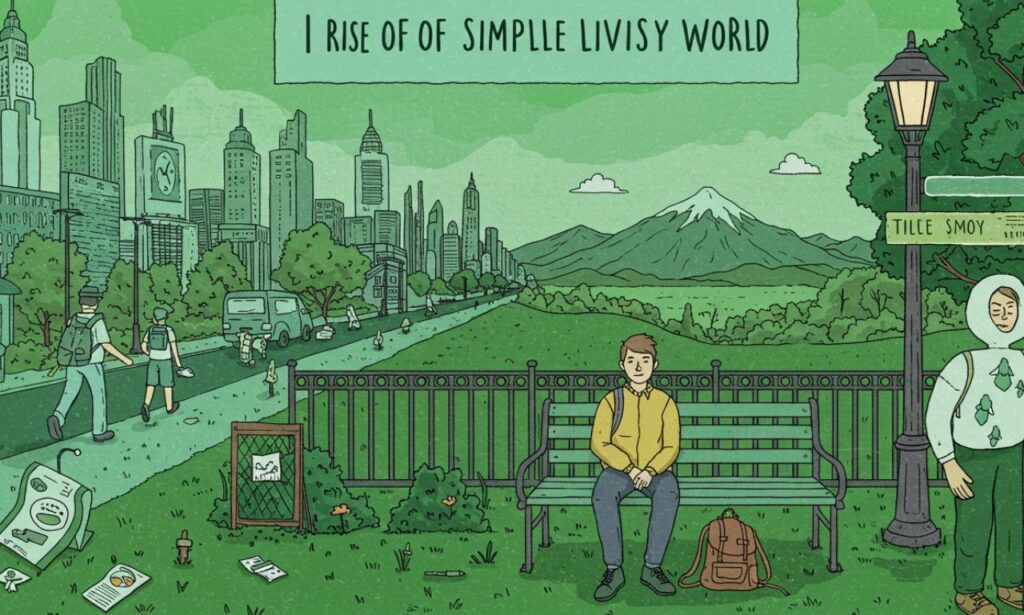In a world obsessed with more — more things, more options, more noise — the minimalist lifestyle is a refreshing alternative. Minimalism is not about living with nothing or depriving yourself of joy; it is about choosing what truly matters and letting go of everything that does not serve you.
As more people seek happiness beyond material possessions, minimalism has become a global movement. It is a way of living that encourages clarity, purpose, and freedom. This article explores the philosophy of minimalism, its benefits, and practical ways to embrace it in daily life.
What is a Minimalist Lifestyle?
A minimalist lifestyle means focusing on what is essential and removing distractions that keep you from living intentionally. It is about curating your home, your schedule, and even your thoughts to make space for peace, creativity, and connection.
Minimalism is not about living with just one chair or owning three shirts. It is about making conscious choices and questioning what you bring into your life — whether physical possessions, commitments, or digital distractions.
The Philosophy Behind Minimalism
Minimalism is more than a design trend; it is a mindset. At its core, it challenges the belief that happiness comes from owning more. Instead, it suggests that contentment is found in having less — but better.
This philosophy has roots in ancient wisdom. Stoic philosophers, Zen monks, and spiritual teachers have long taught that simplicity leads to inner peace. Modern minimalists apply these principles to modern living, finding joy in fewer possessions and more meaningful experiences.
Why Minimalism is Gaining Popularity
In today’s fast-paced, consumer-driven culture, minimalism feels like a breath of fresh air. Many people feel overwhelmed by clutter, debt, and endless digital notifications. Minimalism offers relief — a chance to slow down and regain control.
1. The Rise of Conscious Consumerism
People are becoming more aware of the environmental and psychological costs of overconsumption. Minimalism encourages buying less but choosing quality products that last longer.
2. Mental Health Awareness
Clutter can cause stress and decision fatigue. A clean, organized space supports mental clarity and reduces anxiety.
3. Financial Freedom
Spending less on unnecessary items allows individuals to save money, pay off debt, or invest in experiences like travel, education, or hobbies.
Benefits of Living a Minimalist Lifestyle
Minimalism is not just about having fewer things — it’s about having more time, freedom, and energy for what matters most.
1. Less Stress and More Peace
When your environment is free of clutter, your mind feels calmer. A minimalist home is easier to clean and maintain, giving you more time to relax.
2. Improved Focus and Productivity
Minimalism removes distractions, allowing you to focus on your priorities — whether it’s your career, relationships, or personal growth.
3. Better Relationships
Minimalism encourages quality over quantity in relationships. You spend time with people who uplift you instead of trying to please everyone.
4. Greater Financial Control
Owning fewer items means less money spent on storage, repairs, and impulse purchases. Many minimalists report feeling freer and more secure financially.
5. Environmental Impact
By consuming less, you reduce waste and lower your carbon footprint — contributing to a healthier planet.
Practical Tips to Start Your Minimalist Journey
Transitioning to minimalism does not have to be extreme. You can start small and build momentum over time.
1. Declutter Your Space
Pick one room, drawer, or closet at a time. Ask yourself: “Do I use this? Does it bring value to my life?” If not, donate, sell, or recycle it.
2. Simplify Your Wardrobe
Create a capsule wardrobe with versatile, quality pieces that match easily. This saves time when getting dressed and reduces decision fatigue.
3. Minimize Digital Clutter
Unsubscribe from emails you never read, delete unused apps, and limit social media time. A clean digital space is just as important as a clean home.
4. Practice Mindful Shopping
Before buying something new, pause and ask: “Do I really need this? Will it improve my life, or is it just temporary excitement?”
5. Focus on Experiences Over Things
Spend money on activities that create memories — like travel, family dinners, or learning a new skill — instead of endless physical items.
Minimalism and Mental Health
A cluttered space can create a cluttered mind. Studies show that messy environments can raise cortisol levels (the stress hormone). Minimalism helps you create a sanctuary where you feel calm and in control.
Many people who adopt a minimalist lifestyle report lower anxiety, improved sleep, and a stronger sense of purpose. By reducing noise — both physical and mental — minimalism creates room forcreativity, gratitude, and mindfulness.
Minimalist Lifestyle Myths
Minimalism is often misunderstood. Let’s clear up some common myths:
-
Myth 1: Minimalists own nothing.
Reality: Minimalism is about intentional ownership, not living like a monk. -
Myth 2: Minimalism is boring.
Reality: Minimalism allows you to invest in things you truly love, making your life richer and more fulfilling. -
Myth 3: Minimalism is only for the rich.
Reality: Minimalism is for everyone. In fact, it can help you save money and live better on a budget.
The Future of Minimalism
Minimalism is more than a trend; it’s a cultural shift. As urban spaces shrink and sustainability becomes a global priority, more people will turn to minimalism for practical and emotional reasons.
Businesses are also embracing the minimalist movement by creating eco-friendly products, packaging, and services that promote intentional living.
Conclusion
The minimalist lifestyle is not about deprivation — it’s about living with purpose. By letting go of excess, you make space for joy, creativity, and meaningful relationships. Minimalism can improve mental health, save money, and protect the planet.
If you are feeling overwhelmed by life’s chaos, minimalism offers a way back to balance. Start small, stay consistent, and watch how your life transforms into one filled with clarity and peace.







